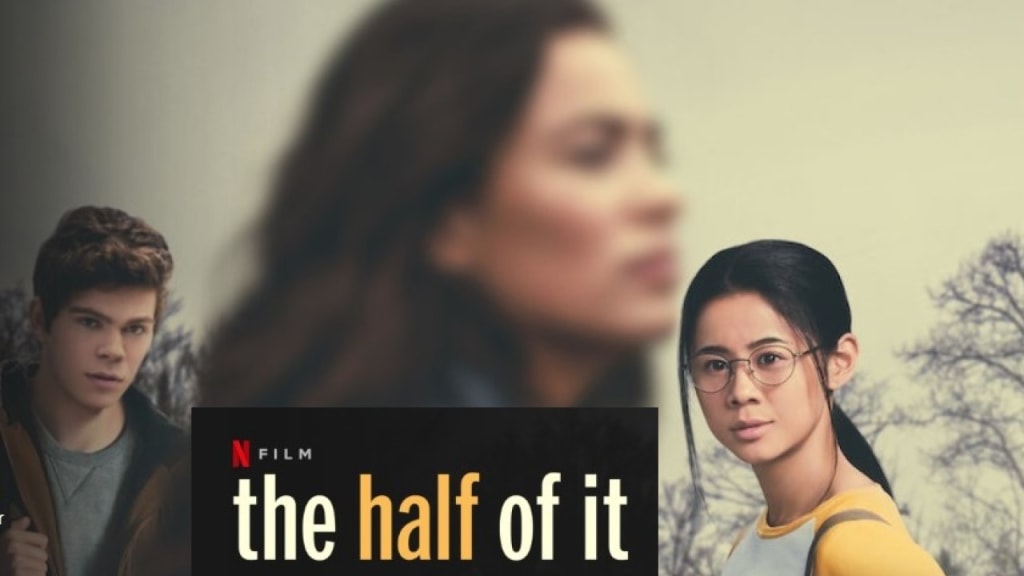
Even as an Asian-American teen myself, this Netflix spin on high school identity, the structure of friendship, and the philosophy of romance came as a surprise. I braced myself for yet another cheesy take on Asian American girls as math obsessed or boy obsessed (hint hint TATBILB), and some sickly sweet and predictable ending. However, thankfully my cynicism was proved wrong, but it was still reasonable founded.
Through out movie history, the portrayal of teens and their first loves has always been either completely frivolous or nauseatingly melodramatic. Think of the typical flick, featuring a slew of shallow and power-hungry teen monarchs subordinating their dim-witted jock consorts and the entire school to their whims, with a timid generic protagonist who's apparently supposed to represent all teenagers to fight the hierarchy. Cliched, right?
What I loved about "The Half of It" was it's subtly breakdown of the cliched and harmful stereotypes imposed on teens and their developing sense of self by adults, with multi-dimensional characters, and shifting the limelight from frilly and adult-engineered fighting for popularity to illuminating how teens realistically develop and cope with their growing emotions, and how their identities may not be completely known to their parents, but accepted and encouraged to blossom by their friends despite societal opposition. Let's examine the different ways "The Half of It" manages to do just that.
First, it makes "crush culture" more realistic. Let's define that term. I don't mean "crush culture" as in the general consensus that everyone should have a crush or be in love, which is the orthodox definition. I'm referring to how people view their crushes, or why they have a crush. Since we've got that out of the way, let's dig in.
The main character and protagonist, bookish, thoughtful, and entrepreneurial Ellie Chu is shown to have feelings for Aster Flores, the trifecta of popularity, looks, and a cool and rich boyfriend Trig. Basically, our first impression of Aster isn't unique to any other teen crush figure, and we think we have her all figured out, that she's shallow and completely quintessential and that Ellie deserves better. This is what we've been conditioned to think by the countless teen flick predecessors to "The Half of It", who all have the same type of love interest.
However, when Ellie starts writing letters to Aster on behalf of awkward but down-to-earth and caring jock Paul Munsky, who is in love with Aster Flores, but is bad with words and doesn't know how to approach her, we see Aster in a whole new light. She has similar tastes and a similar mindset with Ellie, with a high acumen and a thoughtful nature, that make her more than just a beauty. She feels equally trapped by their small town of Squahamish, and feels powerless to stand up for herself against her family and Trig's family, dreading an expected marriage between her and the boyfriend she doesn't quite love in the way she wants to. She's struggling between being a dutiful daughter and a good future wife, and pursuing something more outside of the confines of her strict conservative community, and taking on the risky consequences of being truly free.
This in-depth characterization of Aster Flores is a direct refutation of the typical love interest, who often doesn't have any sort of backstory or opinion in teen movies, other than the archaic and unrealistic object-on-a-pedestal depiction. She's certainly flawed, but we can still see why Ellie falls for her, not for just something superficial like appearance, but the substance of her character, and how Ellie can "get lost in an ocean of her thoughts", as described in the movie, inadvertently showing that teens can experience deep emotions for others not based on stereotypical primal desire. It humanizes Aster and doesn't sexualize her as we see in a lot of teen flicks, and enables us to sympathize and admire her character.
Another way "The Half of It" breaks down stereotypes is with Paul Munsky. Although he's a jock, he doesn't fit the cliched and unrealistic Tina Fey or Judd Apatow prescribed mold. He's not just another cocky fluff-brained eye-candy who's obsessed with ogling and catcalling and hyper-masculine behavior. In fact, he's almost the stark opposite. He works hard and tries his best, whether it's putting out the garbage and helping out at home, or on the football field. Not as bright as Aster or Ellie, Paul struggles with feeling inferior intellectually, exemplified with his heated reaction to Ellie's almost effortless description of Aster's personality versus his generic adjectives of "smart, pretty, and nice", clashing with the idea that jocks only care about sports and look down on nerds.
What I personally admire about Paul is not only his commitment to be Ellie's solid friend and ally, but his devotion to football. He put in the work, finding time to practice endurance through running and other exercises, a quality we rarely see in popular portrayals of teen jocks. Normally, we're just introduced to a talented jock who never really practices his sport unless for the sole purpose of showing off washboard abs or bulging biceps to impress girls. Paul isn't a natural at football. In fact, he was at the lowest rung when we first meet him. But his dedication and hard work, as well as his growing bravery and boldness, is what eventually leads him to beat the high score of his school, transforming him into a seemingly overnight success, and the new "it" guy. Despite newfound popularity, he's still the same awkward and modest Paul we know, and that endears him to us even more.
Now, let's talk about his relationship with Aster Flores. He's a foil to Trig, who treats Aster like a commodity to show off to his friends and his family, and doesn't really care about how she feels or what she's thinking. Paul on the other hand, admires her so much that he's practically tongue-tied when he actually goes out with her, chugging his milkshakes anxiously to avoid talking with her IRL. In this case, he does exemplify the whole putting-your-crush-on-a-pedestal idea, but it serves to show that he's also a flawed teen guy who doesn't know what else to do when faced with conversation with not only his crush, but with anybody. The fact that we can also relate to his struggles with socializing is another reason why this movie is such a hit.
Now, the the brightest jewel on the crown, and the last way that "The Half of It" breaks down teen stereotypes: Ellie Chu in general.
She's not your typical STEM-oriented grades-fixated Asian-American teen girl. Rather, she's philosophical, entrepreneurial, and an avid bookworm, who takes care of her father, forgetting that her ambitions are valid, too. Maybe it's just me, but I experienced a range of emotions when the movie explored her development and her stance on romance, since I can see myself reflected in her. I've always been compared to other Asian girls, mostly unfavorably, since I dislike math and science, and am an English and humanities person, who is also cynical about love. Ellie's evolution on what defines love struck a deep chord within me, to start rethinking why I regard romance and intimacy the way I do, and start exploring ways I can be less sardonic about it.
Furthermore, Ellie provides us a different perspective on teen crushes and friendship, and I daresay embodying the message of the movie. Sure, she's into Aster, but when Paul also likes her, she pushes aside her own feelings in the name of friendship, in the name of selflessness. Too many times we see solid friendships splinter over a love interest because of mutual egoism. Fighting over who gets the girl or gets the guy. Forgetting that true friendship is a precious romance in itself.
She also learns a lot about Paul, and learns from him. In that infamous church scene, where she objects to Trig's proposal to Aster, replacing his Bible-inspired definition of love with her own, or in this case, her altered definition inspired by Paul. Early on, when they discussed what love was, Paul asserted that love is how hard somebody tries to make it work, not some fantastical cinematic notion of big gestures and sentimentality. At first, Ellie scorns it, but it is this definition that she puts forth, along with her own.
Trig declared that love is patient, kind, selfless, free from envy, and other idealistic traits. However, Ellie and Paul maintain that love isn't pretending to be what you're not, otherwise it would be wrong and selfish, since you're holding back yourself and the person you claim to care about. They are also living examples exemplifying that there are many ways to love someone. Loving by putting in work like Paul, loving by connecting and admiring like Ellie. It’s not finding your perfect half, it’s the trying, and reaching, and failing. Most importantly, they assert that love should be your all, not hiding from the risk, like Aster, but going big and all out, a way that none of the characters actually do until the end of the movie.
To wrap up, "The Half of It" redefines teen romance by validating that you're never too young to have deep emotions, and that friendship is just as big and precious as romance. It encourages us to make bigger and bolder strides in the world, shown with Ellie's choice to go to Grinnell, her father letting her go and accepting her mother's death, Aster's bravery in turning down Trig and pursuing art school, and Ellie, in the crowning moment, summoning up the impulsive courage to kiss Aster before leaving Squahamish for good.
"Love is being willing to ruin your good painting for the chance at a great one."
About the Creator
Mia O
"Here's looking at you, kid."






Comments
There are no comments for this story
Be the first to respond and start the conversation.